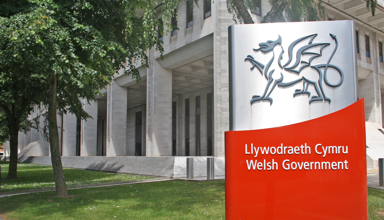The Senedd’s Climate Change, Environment and Infrastructure Committee is warning that people in Wales are being left behind with ‘sub-par, unreliable broadband’ that risks ‘excluding people from modern life’ due to barriers in receiving high-quality superfast internet.
The Committee’s latest report examined broadband connectivity in Wales and found that, despite improvements over the last few years, many people are still unable to access adequate internet speeds.
Although superfast broadband availability in Wales is now at 96%, figures from Ofcom show that take-up in Wales is only around 63%.
Mountainous Wales
The report found that the provision of superfast broadband across Wales was uneven, with urban areas being the first to benefit from better connectivity but many rural areas still being unable to access a decent internet connection.
Ofcom estimates that around 15,000 premises cannot get a broadband service of at least 10Mbps download speed and 1Mbps upload speed from fixed or fixed wireless networks in Wales.
The UK Government’s Project Gigabit is a £5bn project designed to address this issue across the UK with the ‘Gigabit Broadband Voucher Scheme’ created to support rural areas with the installation costs of high-speed broadband.
But because of the mountainous Welsh topography there is a higher proportion of difficult-to-reach properties in Wales compared to other parts of the UK.
And according to Lee Waters MS, the Deputy Minister for Climate Change who gave evidence to the Committee, “UK funding has failed to reflect the true cost of deploying in the Welsh landscape”. To address this issue, and despite it being a non-devolved area, the Welsh Government provided top-up funding to the UK Government scheme to “plug the gap” in Wales.
But from 31 March 2022, the Welsh Government stopped topping-up the gigabit voucher scheme, which has led the Committee to call for the UK Government to raise the amount of support available for individuals and businesses to address the particular needs in Wales.
The report warned that without meaningful engagement between governments there is nothing to prevent the UK administration creating a scheme that again does not meet the needs of Wales.
Connections and Cost
Since March 2020, households that cannot get a download speed of 10 Mbps and an upload speed of 1 Mbps, can request an upgraded connection from BT under the Universal Service Obligation (USO).
This obliges BT to improve the connection for free if the installation cost is estimated to be below £3,400 for the customer. But if the cost exceeds the £3,400 cap, the customer must pay the excess.
The Committee expressed serious concerns that this would simply be unaffordable to many people -particularly in the middle of a cost-of-living crisis - and urged the Welsh Government to discuss raising the level of the cap with the UK Government.
And according to Ofcom, there are an estimated 7,000 ‘hard to reach’ locations where, even with the USO, access to a stable broadband connection wouldn’t be guaranteed.
Inclusion and Affordability
The Committee also heard that one of the many reasons for the lack of take-up of superfast broadband by people was cost. Many internet providers offer ‘social tariff’ packages which are only available to people receiving government benefits which allows them to access cheaper internet deals.
But the report highlights the worrying fact that only 1.2% of those eligible for a ‘social tariff’ had accessed the scheme, potentially leaving thousands of low-income households paying over the odds for their broadband.
The Committee proposes that action should be taken to increase the number of households enrolling on ‘social tariffs’ by making the process clearer and simpler. Lack of awareness of ‘social tariffs’ was noted as a significant issue with the Committee proposing that their promotion must be improved and consideration should even be given to the automatic enrolment of those eligible.
In light of the severe cost-of-living crisis, the report warns that there is a risk that superfast broadband access will become a luxury that many will not be able to afford.

LLyr Gruffydd MS
Chair of the Climate Change, Environment and Infrastructure Committee
“It is extremely disappointing to hear of many people in Wales still unable to access superfast broadband. Especially since the pandemic, more and more of our lives are lived online, and it’s simply unfair that many in rural areas are expected to put-up with sub-par, unreliable broadband. Everyone in Wales, not just those in urban areas, should be able to access a high-speed internet connection - this shouldn’t be a luxury.
“Many of the issues we examined are non-devolved so we urge the Welsh Government to take on board our recommendations and present the solutions in this report to the UK Government - or the failures we see in this report will be repeated.
“With living costs rising sharply, the UK Government must urgently look at raising the Universal Service Obligation cap and improving the take-up of broadband services offering a ‘social tariff’. If things don’t change, we will undoubtedly see more people excluded from modern life.”
Digital connectivity - Broadband Read the Report





